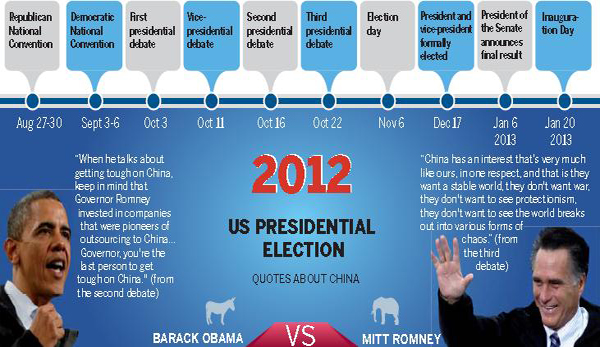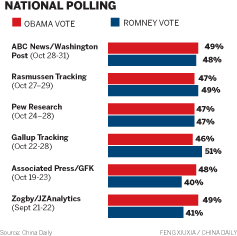China-bashing ad takes voters for a ride
Updated: 2012-11-05 09:34
By Chen Weihua (China Daily)
|
||||||||

Candidates clash over whether automakers sent jobs overseas
In the final days of a close US presidential race, both candidates have been battling intensively in swing states, particularly Ohio. And one of the key issues they have been debating is whether automakers General Motors and Chrysler have shipped jobs to China.
Republican Mitt Romney's campaign, seizing on a recent news report that Chrysler is planning to open a Jeep plant in China, launched TV and radio ads in Ohio and Michigan to attack President Barack Obama.
"Barack Obama says he saved the auto industry. But for who? Ohio, or China? Under President Obama, GM cut 15,000 American jobs. But they are planning to double the number of cars built in China, which means 15,000 more jobs for China," the radio ad says.
"And now comes word that Chrysler plans to start making jeeps in, you guessed it, China. What happened to the promise made to autoworkers in Toledo and throughout Ohio, the same hardworking men and women who were told that Obama's auto bailout would help them?" says the ad.

The TV commercial sends the same message, accusing Obama of selling Chrysler to Italian firm Fiat, which is going to build jeeps in China.
Campaigning in Ohio, Wisconsin and Virginia on Nov 3, Obama accused Romney of being "dishonest" in the ads.
"It's not true. Everybody knows it's not true," Obama told a cheering crowd in Mentor, Ohio. He then said the car companies themselves told former governor Romney to knock it off.
Obama has repeatedly rebuked Romney over that ad in the past days. At a rally on Nov 2 in Hilliard, a suburb in Columbus, Ohio, Obama accused Romney of frightening voters.
"This isn't a game. These are people's jobs. These are people's lives. And you don't scare hardworking Americans just to scare up some votes. That's not what being president is all about," Obama said.
In a counterattack, the Obama campaign aired TV ads in Ohio and Michigan, saying Romney's ad was false. The ads emphasized that Chrysler Jeep was not cutting jobs, but adding them in Ohio. The ad then reminds voters of Romney's New York Times opinion piece in August 2011 headlined "Let Detroit Go Bankrupt".
Chrysler and Fiat chief executive Sergio Marchionne said repeatedly in the last week that Chrysler is not moving any US Jeep production to China. On the contrary, it is planning to add Jeep jobs in the United States. And its production in China is only intended for sale in the Chinese market.
GM, meanwhile, also defended itself from Romney's attack.
"We've clearly entered some parallel universe during these last few days. No amount of campaign politics at its cynical worst will diminish our record of creating jobs in the US and repatriating profits back to this country," GM spokesman Greg Martin was quoted as saying by the Detroit Free Press.
The Obama campaign has often touted the $85 billion auto bailout, made mostly after 2009, as a success, stressing that Obama is willing to make tough, albeit unpopular, decisions to save US jobs.
Various polls showed that Obama has a small lead in Ohio. This looks ominous for Romney, because no Republican in the last 50 years has won the presidency without winning Ohio.
Michael Tanner, a senior fellow at the Washington-based Cato Institute, said it makes more sense for US automakers to stay competitive and make cars in China for the Chinese market.
Jagdish Bhagwati, a professor of economics at Columbia University, agreed, saying the huge Chinese market has contributed a great deal to the success of the US auto bailout.
Most international automakers have beefed up their presence in China over the past few decades by setting up joint ventures. As a result, China, the world's fastest-growing car market, has become an increasingly important cash cow for these big automakers.
But for the two presidential candidates, China has been a bogeyman, and will remain so, at least for one more day.
chenweihua@chinadaily.com.cn

 Relief reaches isolated village
Relief reaches isolated village
 Rainfall poses new threats to quake-hit region
Rainfall poses new threats to quake-hit region
 Funerals begin for Boston bombing victims
Funerals begin for Boston bombing victims
 Quake takeaway from China's Air Force
Quake takeaway from China's Air Force
 Obama celebrates young inventors at science fair
Obama celebrates young inventors at science fair
 Earth Day marked around the world
Earth Day marked around the world
 Volunteer team helping students find sense of normalcy
Volunteer team helping students find sense of normalcy
 Ethnic groups quick to join rescue efforts
Ethnic groups quick to join rescue efforts
Most Viewed
Editor's Picks

|

|

|

|

|

|
Today's Top News
Health new priority for quake zone
Xi meets US top military officer
Japan's boats driven out of Diaoyu
China mulls online shopping legislation
Bird flu death toll rises to 22
Putin appoints new ambassador to China
Japanese ships blocked from Diaoyu Islands
Inspired by Guan, more Chinese pick up golf
US Weekly

|

|






